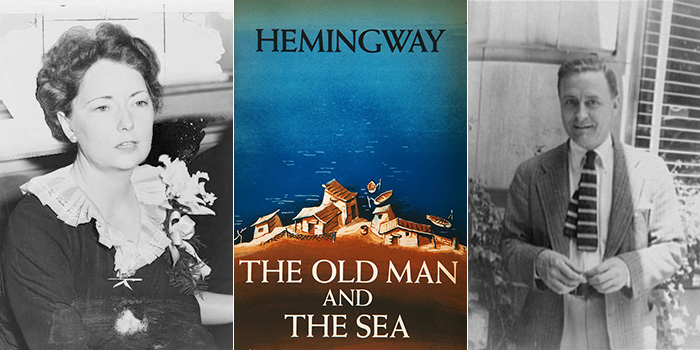A writer’s most telling stories are sometimes the ones they aren’t able to—or don’t intend to—share.
A handful of fascinating personal papers, including several from Southern writers, along with correspondence from CIA double agent Aldrich Ames, Civil War memorabilia, and artifacts from the Titanic, will be available at auction on Wednesday, September 30. The letters, photographs, and manuscripts are rare finds that have been tucked away in private collections and family homes for decades.

Photo: All photos courtesy Library of Congress
From left: Margaret Mitchell; cover of Ernest Hemingway’s The Old Man and the Sea; and F. Scott Fitzgerald.
“Letters are unlike any other collectable,” says David Lowenherz, founder of Lion Heart Autographs, which specializes in autographs and manuscripts. “When people write these letters, they generally assume the communications stay private. When that is not the case, we learn so much about their personalities. Where else are you going to find that?”
For example, Tennessee Williams’ letters shone a light on what he tried to keep hidden, like instructing his publisher to keep an explicit short story collection out of St. Louis, where his mother might read it. Truman Capote’s four decades of correspondence are the closest thing we have to an autobiography from the In Cold Blood author. The thirteen-year-long correspondence between Eudora Welty and crime novelist Ross Macdonald, recently published in the book Meanwhile There Are Letters, reveals a relationship that grew from professional admiration to affection.
Here are the five pieces (and a bonus photo) we’re most excited to see from the auction.
Gone With the Wind author Margaret Mitchell letter about a sequel
After Margaret Mitchell’s beloved book was released in 1936, it became one of the best-selling novels of all time. So it’s no wonder people would write to inquire about what happened to Rhett and Scarlett after the final chapter. In this letter, Mitchell closes the book: To me, the lives of my characters ended on the last page, and your guess is as good as mine as to what happened thereafter.

Hemingway letter on fishing and filming “The Old Man and the Sea”
Ernest Hemingway typed out a quick letter from his home in Cuba to the screenwriter of his “The Old Man and the Sea” film adaptation. Classic Hemingway themes run throughout, chief among them fishing in his beloved boat: …went out in Pilar June 27. Purple water but heavy set to westward. Caught one marlin only one seen.

Woody Guthrie manuscript with the lyrics for an unpublished song
This note dated 1946 describes in Guthrie’s own words how the Oklahoma-born folk singer could make up a song at the drop of a hat. He also shared the lyrics to his never-commercially recorded song “Bugeye Jim,” which was later covered by Billy Bragg and Wilco.

Sad F. Scott Fitzgerald letter one month before his death
The Great Gatsby writer’s life was full of drama and tragedy. Although he was handsomely paid at the height of his career, he and his wife, the Alabama-born Zelda, were notorious for blowing their money on living the high life. In this note, he asks an acquaintance for a small amount of money, curtly stating, “I’m in debt and I need it.” Fitzgerald died after a heart attack less than a month later, and this letter may have been his last.

DuBose Heyward thank-you letter for a review of his novel Porgy
South Carolina writer DuBose Heyward’s 1925 novel chronicled early twentieth century Charleston and included characters who spoke in the Gullah language. In this letter, DuBose thanks a reviewer for a positive write-up. George Gershwin adapted the book for an opera, Porgy and Bess, in 1935.

Bonus rare image: Inscribed photograph of Red Badge of Courage author Stephen Crane
This photograph of the author of the 1895 Civil War classic The Red Badge of Courage is one of only five known examples and the only one in private hands. When the image was captured in 1897, Crane was 25 and working as a journalist covering the Greco-Turkish War. He inscribed the image to a fellow journalist: To S. S. Chamberlain / with many regards / Stephen Crane /Athens / May 20 / 97.

Wednesday’s auction includes these items and more than one hundred others. Buyers can register to bid online.







